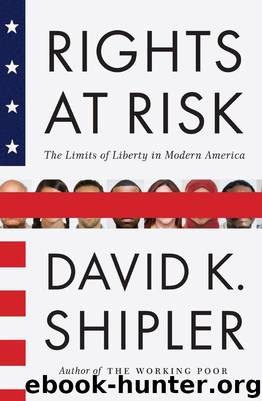Rights at Risk: The Limits of Liberty in Modern America (Vintage) by Shipler David K

Author:Shipler, David K. [Shipler, David K.]
Language: eng
Format: mobi
ISBN: 9780307957627
Publisher: Random House, Inc.
Published: 2012-03-06T05:00:00+00:00
CHAPTER SIX
Silence and Its Opposite
Every idea is an incitement.
—Oliver Wendell Holmes
MIGHTIER THAN THE SWORD
FIVE DAYS AFTER September 11, amid the country’s tense anxiety, seven young men in Northern Virginia gathered for dinner to talk about their fears of vigilantism against Muslims and to hear from Ali al-Timimi, a cancer researcher who had earned a reputation as an erudite lecturer on Islam. His words that evening were later judged to have crossed an invisible line that had been drawn and redrawn over many decades—the ambiguous boundary between the exercise of liberty and the commission of a crime.
The First Amendment does not say that Congress (now taken to mean all levels of government) is allowed to make some laws abridging speech, the press, religion, and the right to assemble. It says, “Congress shall make no law,” unqualified language that may tempt absolutists to ask judges and legislators, “What is it about ‘no’ that you don’t understand?”
Yet the framers were not categorical, and courts and legislatures have never treated any part of the Bill of Rights as absolute. Instead, every provision has been woven into a matrix of exceptions, compromises, escape clauses, waivers, and fuzzy limits that enlarge or reduce the umbrella of protection. The shelter of the First Amendment has been broadened considerably since ratification, especially in the last half of the twentieth century, but it does not shield every statement, symbol, or expressive act. Outside its preserve lies speech whose consequences are deemed so severe that government is granted the authority to punish. Seldom rising above the fleeting moments of history, judges draw those boundaries at what they perceive as the balancing points of liberty against order, individual interests against community welfare, overarching constitutional principle against the particulars of a given circumstance.
Timimi may have thought he was free to say anything. Born in the United States a year after his parents emigrated from Iraq, he attended an elite private school in Washington, D.C., before moving at age fifteen with his family to Saudi Arabia, where he spent five years in Islamic study. Then he returned to college in the United States. “Many of my best qualities are simply because I am an American,” he told The Washington Post. One of those qualities may have been a belief that he was entitled to state his opinions, even those “counter to the mainstream of American society,” as he described them.1
When he spoke to the young Muslims that evening, Timimi made three points in his hour-long talk, according to Milton Viorst, a writer whose son had been Timimi’s school chum years before. First, he held “that the 9/11 attacks augured the imminence of the end of days. Muslims, he said, had a duty to repent their sins.” Second, he suggested that “they and their families might best leave America, following the precedent of the Prophet Muhammad,” who in A.D. 622 fled to Medina from persecution in Mecca. “As his third point, Ali reviewed—rashly, as it turned out—the Islamic doctrine of jihad as holy war,
Download
This site does not store any files on its server. We only index and link to content provided by other sites. Please contact the content providers to delete copyright contents if any and email us, we'll remove relevant links or contents immediately.
| Anthropology | Archaeology |
| Philosophy | Politics & Government |
| Social Sciences | Sociology |
| Women's Studies |
The Secret History by Donna Tartt(16656)
The Social Justice Warrior Handbook by Lisa De Pasquale(11492)
Thirteen Reasons Why by Jay Asher(7801)
This Is How You Lose Her by Junot Diaz(5797)
Weapons of Math Destruction by Cathy O'Neil(5046)
Zero to One by Peter Thiel(4834)
The Myth of the Strong Leader by Archie Brown(4795)
Promise Me, Dad by Joe Biden(4455)
Beartown by Fredrik Backman(4433)
Stone's Rules by Roger Stone(4422)
How Democracies Die by Steven Levitsky & Daniel Ziblatt(4412)
The Fire Next Time by James Baldwin(4350)
100 Deadly Skills by Clint Emerson(4085)
A Higher Loyalty: Truth, Lies, and Leadership by James Comey(4038)
Rise and Kill First by Ronen Bergman(4019)
The David Icke Guide to the Global Conspiracy (and how to end it) by David Icke(3891)
The Farm by Tom Rob Smith(3878)
Secrecy World by Jake Bernstein(3788)
The Doomsday Machine by Daniel Ellsberg(3736)
